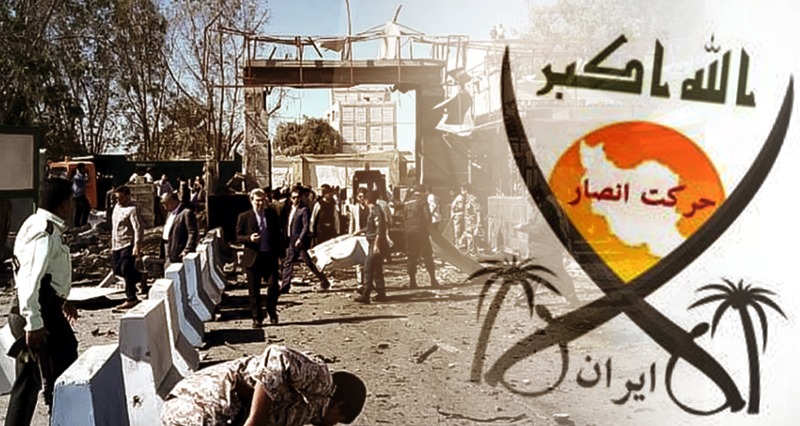Over the last three months Iran, which maintains a high level of security in relation to other Middle Eastern countries, has twice been the victim of terrorist attacks. Iranian security forces were the target on both occasions. On the morning of December 6, a pickup truck rigged with explosives and driven by a suicide bomber moved toward a police headquarters in Chabahar, located in the southeastern province of Sistan-and-Baluchestan. However, the terrorist was thankfully unable to reach his target. Iranian police officers managed to stop the truck before it reached its destination, but the explosion still went off resulting in several deaths and numerous injuries.
https://twitter.com/RAW_RESEARCH/status/1070596003374329856
Aftermath photos of #Chabahar terrorist attack which led to at least 4 martyrs and many injured when car bomb exploded outside police station. #Iran pic.twitter.com/hz2SNnV9ZL
— The'Nimr'Tiger (@Souria4Syrians) December 6, 2018
4 people, including 2 police officers, lost their lives in the attack. The blast injured ten officers and 32 civilians. According to the Iranian authorities, the ‘Ansar al-Furqan’ rebel group has claimed responsibility for the assault.
The terrorist group of Ansar Al-Fotrghan released picture of ‘Abdollah Azizi’, the suicide car driver who attacked the police headquarters in #Chabahar, killing two sentries and injuring a number of other people pic.twitter.com/jMCops8FZW
— Tasnim News Agency (@Tasnimnews_EN) December 9, 2018
Why Chabahar?
There may be several motivations for the attack, but two stand out. First, the ‘Ansar al-Furqan’ group wanted to take revenge on Iranian militants for the murder of their leader Jalil Qanbarzehi.
The ‘Ansar al-Furqan’ is a Sunni Muslim militant group from the Balochi tribe. There was a time when its rebels were members of a more famous terrorist organization in Iran, the ‘Jundullah’ (Soldiers of God). The main mission of the Jundullah was resisting Shiite harassment by the authorities. This terrorist group has killed about 400 Iranian soldiers.
‘Ansar al-Furqan’ is the successor to ‘Jundullah’ which had been led by Abdolmalek Riggi. ‘Ansar al-Furqan’ is a Sunni Islamist rebel group who operates in Iran’s southeastern Sistan-and-Baluchistan province along the border with Afghanistan and Pakistan – the most poorly protected and loosely controlled area, where smugglers of drugs, fuel, and even slave-traders are very active.
Iran had claimed for a long time that ‘Jundallah’ was being supported by the United States, although Washington denies the accusation. According to Iranian officials, the group also has links with the ‘Al-Nusra front’, the Syrian branch of the ‘Al-Qaeda’.
In early 2012, Foreign Policy magazine cites CIA memos from 2007-2008 that show Mossad had recruited members of the Jundallah terror group in their fight against Tehran.
https://twitter.com/TheRalphRetort/status/983026690120212480
Perhaps, ‘Ansar al-Furqan’ has other motives for the assault than avenging the murder of their leader Jalil Qanbarzehi: it seems likely that attack was supported by the primary enemies of Iran – Israel and the United States of America.
Of course, local problems do exist with the Sunni rebel group and other terrorist organizations like the ‘Jaish al-Adl’, who struggle against the so-called ‘Shiite usurpers’ in Baluchistan-and-Sistan province of Iran, but, we must never forget that these terrorists don’t usually attack randomly: their operations are planned and targeted. They may have had not only ideological but also economic reasons for conducting the attack.
Chabahar is a port city with a Free Trade-Industrial Zone. It offers a lot of privileges for foreign investors. One of the regions attractive projects is the development of the international port of Chabahar.
In May 2016, Iran, India and Afghanistan signed an agreement to develop the Iranian port of Chabahar (port Shahid Beheshti) and make it a hub on the Indian Ocean to increase trade.
However, the fact is that Chabahar is a strategic port for India, Afghanistan, Pakistan and the Central Asian countries because of its specific economic characteristics. The development of Chabahar allows Iran to gain access to the Eastern Asian and the Central Asian, Caucasian and also South African trade markets. Chabahar can make Iran a central part of the Middle Eastern economy and help it participate in a global trade.
The development of this port offers great prospects for Iran to strengthen its economic stability and gives it the opportunity to become a strategic maritime hub for global trade. This fact is not acceptable for the United States and their ally Israel, because they both want to paralyze the Iranian economy.
Therefore, it is likely that these enemy states are interested in preventing the inflow of foreign investment in the development of the Iranian port of Chabahar. They have shown they are willing to use any means, including the rebellious Baluchi Sunnis, in order to achieve their goals. By carrying out the terror attack, they create chaos in a region and sew the seeds of doubt in potential investors.
Chabahar is a serious social problem for Iranian officials
Although Chabahar has enormous economic potential due to its strategic geopolitical position and creates real opportunity for investors, the city’s society is unbalanced: there is a huge wealth gap between the rich and poor. There are extremely rich businessmen in Chabahar and there are many people who live below the poverty line living in slums. Chabahar has some of the biggest inner-city slums in the country and a huge number of people living in poverty.
Recently, the Tasnim state-run News Agency detailed the condition of slum dwellers in Sistan-and-Baluchistan, the most underdeveloped, desolate, and poorest of Iran’s provinces.
“Sistan-and-Baluchistan has the most number of slum dwellers in Iran. Of the 2.7 million inhabitants, 500,000 live in slums,” the news agency wrote.
https://twitter.com/nikooamini/status/1069601020085452800
The poverty factor sometimes forces these slum dwellers and people dissatisfied people with the standard of life in Chabahar to do desperate things for a piece of bread, such as smuggling fuel or drugs. Others join to the radical rebel groups like ‘Ansar al-Furqan’.

















Leave a Reply